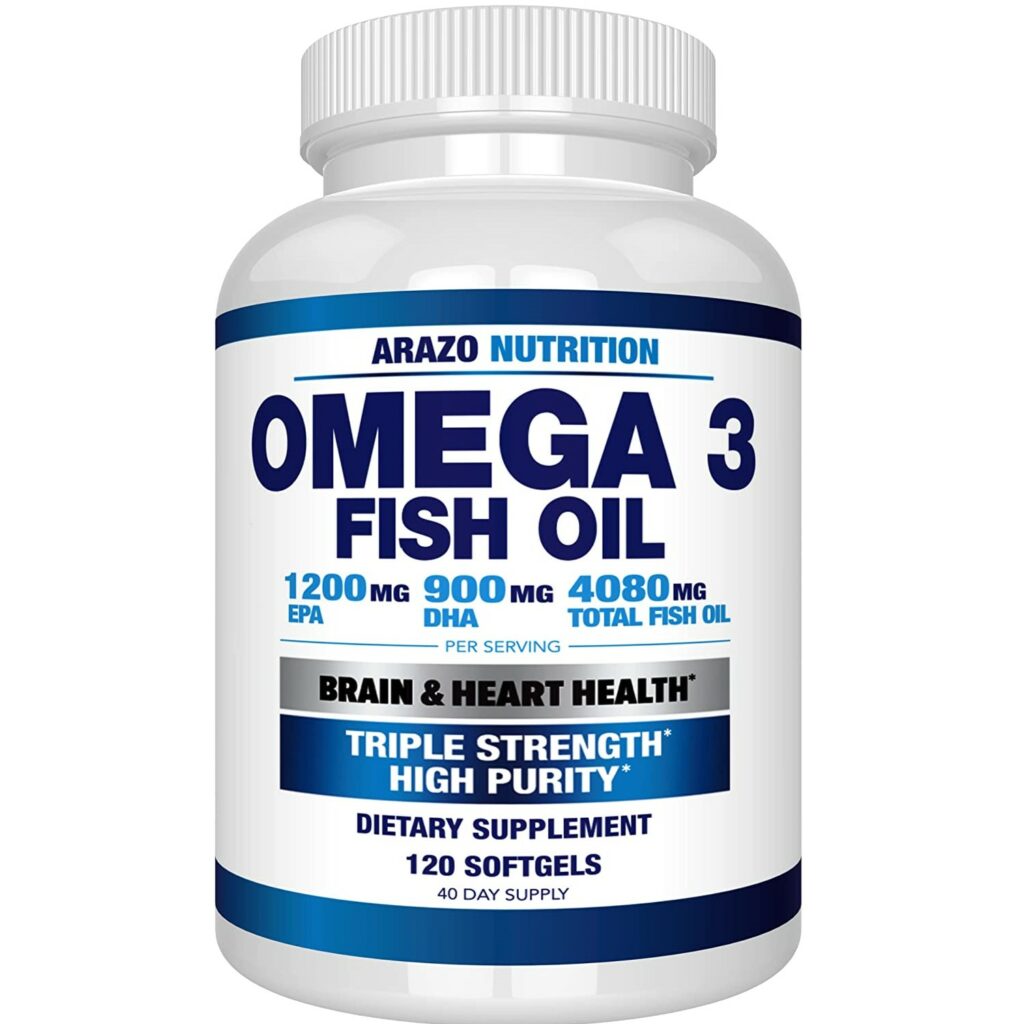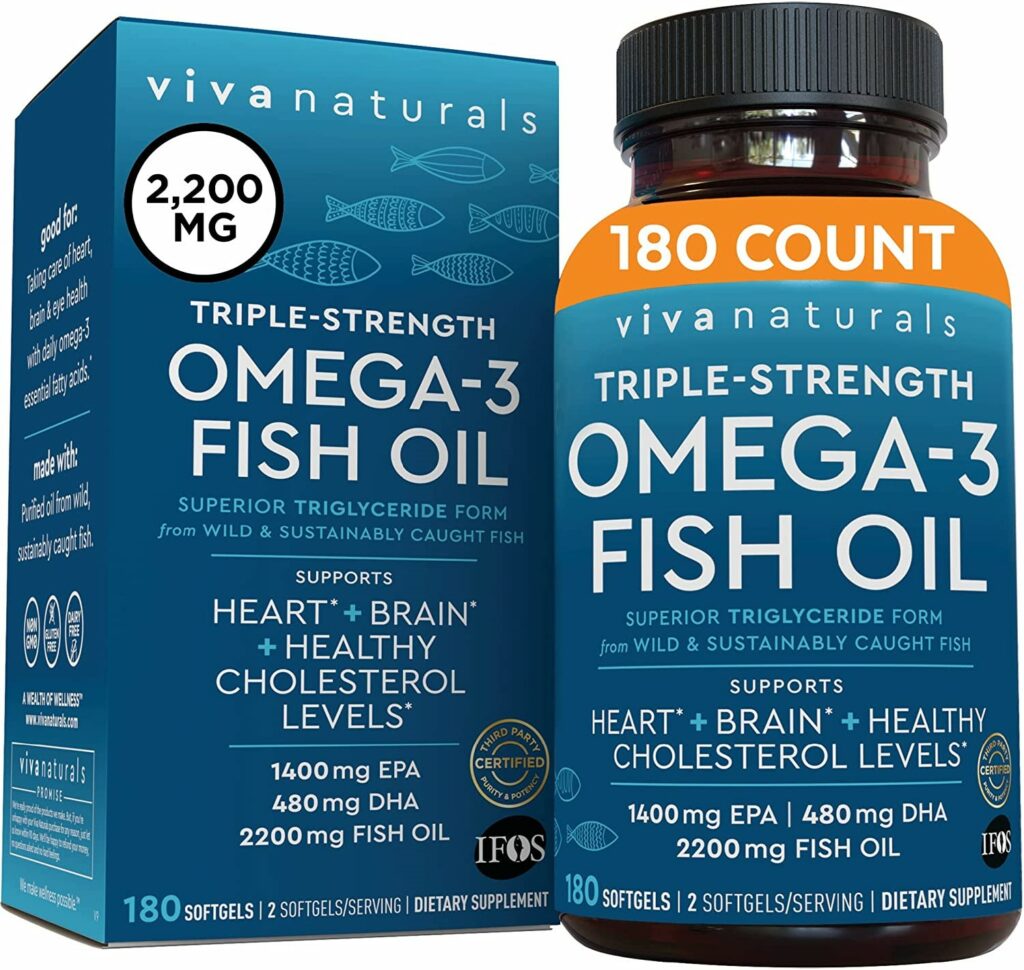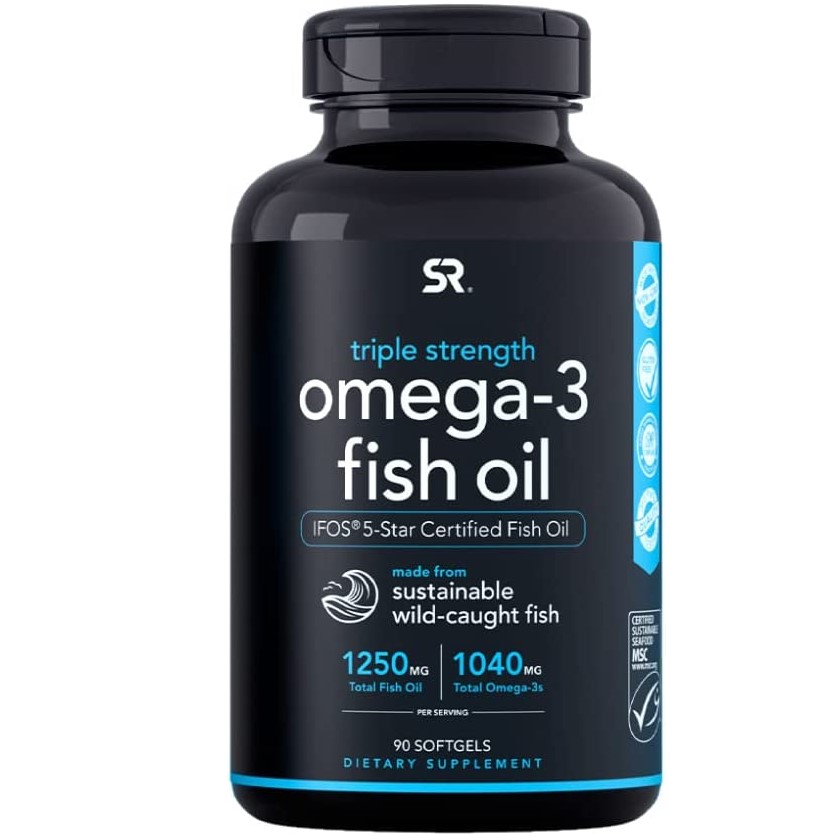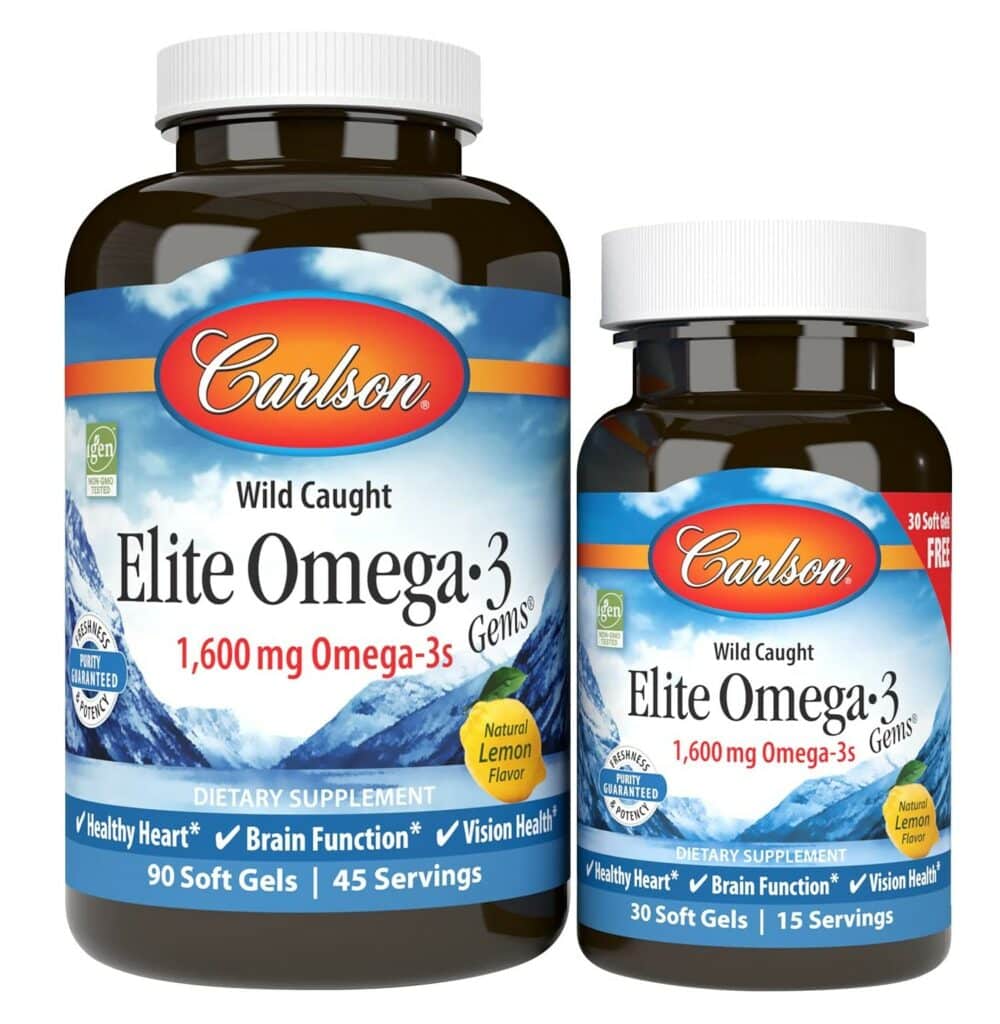Fish Oil is high in Omega 3 fatty acids, which contribute to your overall health by supporting joint, brain and eye health, among other benefits.
Fish oil is an incredibly popular supplement, as nearly 8% of US adults regularly use it, according to the National Center for Complementary and Integrative Health (NCCIH).
However, not all supplements are created equal, so we’ve made this guide on the best fish oil supplements to help you find a product that supports your health needs and lifestyle.
Fish oil is rich in Omega-3 fatty acids that are essential to your wellbeing, as they help reduce inflammation, improve joint health and even boost mental health, but many Americans don’t meet their recommended intake through diet. The American Heart Association (AHA) recommends eating two servings of (preferably fatty) fish a week, but not everyone likes oily fish or can eat the recommended amounts, which is where dietary supplements come in.
As we’ve written about previously on Supplements You Can Trust, fish oil supplements have a variety of health benefits, such as supporting brain function, immune response, and joint health. Whether you’re an athlete, a bodybuilder, or an average joe, the best fish oil supplements offer potent health benefits for people of all kinds.
Table of Contents
A Quick Look at the Best Fish Oil Supplements
Although we are comparing like-for-like products, there can be significant variations in active ingredients due to variations in the raw ingredients and processing methods used to make fish oil. Our recommended fish oil supplements were chosen for the ingredient quality, ease of use, and affordability, so without further ado, here are our picks for the best fish oil supplements:
1. Arazo Nutrition Omega 3 Fish Oil Softgels
Arazo Nutrition’s fish oil supplements are sourced from wild ocean fish and made in a GMP-certified facility in the USA for superior quality control and oversight.
These supplements are also purified with molecular distillation to remove heavy metals and PCBs and flavored with lemon for pure nutrition without the fishy after-taste.
2. Viva Naturals Triple-Strength Omega-3 Fish Oil Softgels
These triple-strength fish oil supplements contain 1,100mg of fish oil, including 700mg of EPA and 240mg of DHA in each soft gel capsule, making them the most potent supplements on this list.
What’s more, Viva Naturals use triglyceride omega-3s for better absorption and purify the fish oil to (allegedly) remove the fishy after-taste of fish oil supplements.
3. Sports Research Triple Strength Omega-3 Fish Oil Capsules
Just one of Sports Research’s fish oil supplements contains 1,040mg of Omega-3 with 690mg of EPA and 260mg DHA to give you the daily recommended amount in one convenient package.
In addition to being the second-most concentrated supplements on this list, they are GMO-free and manufactured in the USA from Alaskan pollock, making them one of the best fish oil supplements available.
4. Carlson Elite Omega-3 Gems
These fish oil supplements are sustainably sourced from cold-water fish stocks and contain a hefty 800mg of Omega-3 fatty acids in each softgel.
What’s more, these supplements are flavoured with natural lemon extract to improve the taste, making these easier to take for people that hate the typically ‘fishy’ taste and smell of fish oil.
Benefits of Fish Oil (and Omega-3 fatty acids)
Most of fish oil’s health benefits come from the Omega-3 fatty acids it contains, especially eicosapentaenoic acid (EPA) and docosahexaenoic acid (DHA). These polyunsaturated fats are essential fatty acids (meaning your body cannot produce them) and play important roles in many bodily processes, including brain function and heart health.
Even if you are relatively healthy, using fish oil supplements has many health benefits, including:
1. Heart Health Support

Heart disease is the most common cause of death worldwide, but studies link consumption of fish and fish oil to reduced risk factors like improved cholesterol levels, decreased triglycerides, reduced blood pressure, and plaque prevention. Subsequently, the best fish oil supplements may lower your risk of heart disease, especially if you pair them with a healthy lifestyle that includes regular exercise and a balanced diet.
2. Mental Health Support

Your brain is nearly 60% fat, and much of this fat is made of Omega-3 fatty acids, so keeping your Omega-3 levels topped up with fish oil supplements is a good way to support healthy brain function. Furthermore, studies show that supplementing with Omega-3s can improve the symptoms or prevent you from developing some mental health conditions and may even help treat schizophrenia and bipolar disorder in higher doses.
3. Eye Health Support

Like your gray matter, your eyes need omega-3 fatty acids to function, and low levels of omega-3s are linked to increased risks of eye diseases, especially Age-related Macular Degeneration (AMD). However, studies on some of the best fish oil supplements available have not found a conclusive link between omega-3 supplements and improved eyesight.
4. Decreased Inflammation

Inflammation is a natural response to infection and injuries, but chronic inflammation is associated with health conditions like heart disease and diabetes and can cause serious health issues if left unchecked. Fish oil is naturally anti-inflammatory, so it may help treat conditions linked to chronic inflammation like rheumatoid arthritis.
5. Healthy Skin

Your skin is easily the largest organ in (technically on) your body at an average of 8 pounds (3.6kg) and 22 square feet (2 square meters), and it contains a lot of Omega-3 fatty acids. Declining levels of Omega-3s in your skin are linked to skin disorders like psoriasis and dermatitis, so using the best fish oil supplements can help support skin health.
6. Pregnancy and Early Life Support

Omega-3 fatty acids are essential for early growth and development, so supplementing with fish oil during pregnancy and while breastfeeding may improve brain development in your children. Taking fish oil supplements during these periods may also improve visual development and reduce the risk of allergies in infants.
7. Reduced Liver Fat

Because your liver processes most of the fat in your body, increased liver fat indicates liver disease, particularly Non-Alcoholic Fatty Liver Disease (NAFLD). Fortunately, the best fish oil supplements improve liver function and tackle inflammation, which may reduce symptoms of NAFLD and the amount of fat in your liver tissue.
Pros and Cons of Fish Oil Supplements
Although Omega-3 fatty acids have many impressive benefits, fish oil supplements aren’t right for everyone, and they come with some potentially serious side effects. So, whether you’re looking for the best fish oil supplements or considering ditching your fishy pills, here are the pros and cons of fish oil supplements:
CONS:
1. Fishy Taste
Unsurprisingly, fish oil supplements can taste extremely fishy and leave an unpleasant aftertaste even when you wash them down with a drink. While many manufacturers claim to filter out the impurities that cause the fishy flavor (or mask it with lemon extract), many fish oil supplements will leave a bad taste in your mouth…
2. Stomach Issues
Taking fish oil supplements may cause stomach issues – such as indigestion, nausea, and loose stools – especially in people with gastrointestinal issues like Crohn’s Disease. Fortunately, many of the best fish oil supplements use enteric coatings, which keep the capsules from dissolving until they reach the small intestine and remove most potential stomach issues.
3. May Worsen Bleeding or Blood Pressure Issues
The National Institutes of Health (NIH) warn against taking high-dose omega-3 supplements with blood thinning medication, as they can increase the risk of bleeding or easy bruising. Although these drug interactions are relatively rare, you should ask your doctor about taking fish oil supplements if you’re on any blood-thinning medicine.
4. Incomplete Nutritional Profile
While fish oil supplements are a great source of Omega-3 fatty acids, they lack other nutrients in oily fish like sardines, which are an excellent source of vitamin B12. While some of the best fish oil supplements contain added nutrients like vitamin B12, eating oily fish (if you enjoy it and have easy access to a good grocery store) is a better option for rounded nutrition.
PROS:
1. Convenience
Fish oil supplements are a much easier way of getting your recommended intake of Omega-3 fatty acids than food sources, as they require no cooking, can be safely stored for years, and are easy to take.
2. Cost
Gram for gram, fish oil supplements are a much cheaper source of Omega-3 fatty acids than natural food sources, and the best fish oil supplements help you get your daily recommended intake of Omega-3 fatty acids for less.
3. Concentration
Some fish oil supplements feature extremely high concentrations of Omega-3s, with some brands containing more Omega-3s than an entire serving of salmon!
Types of Fish Oil Supplements
As the old saying goes, “there are plenty of fish in the sea”, and there are plenty of types of fish oil supplements available, ranging from natural green-lipped mussel oil to DHA-enriched fish oil. The main difference lies in how it’s processed, so we’ve listed the properties of each of the main types to help you find the best fish oil supplements for your needs:
Natural Fish Oil
Derived from the flesh of fatty fish like herring, mackerel, sardines and salmon, the Omega-3 fatty acids in natural fish oil are mostly present in their triglyceride forms, which means they can be easily absorbed.
Processed Fish Oil
Many food chemists convert the triglycerides into ethyl esters during the refinement of fish oil, which allows them to adjust the concentrations of DHA and EPA to try and create the best fish oil supplements.
Reformed Fish Oil
After refinement, chemists can convert the ethyl esters back into triglycerides to improve absorption, and the finished fish oil is often termed “reformed.”
RELATED: Read our blog on the differences between cod liver oil and fish oil to learn more about the benefits of Omega-3s.
Capsules
The most common form of fish oil supplements is capsules and softgels, as they are easy to swallow and mask the fishy taste. Furthermore, some of the best fish oil supplements are enteric coated, which minimises the risk of stomach issues even in higher doses.
Liquid
You can also buy fish oil in a bottle, which allows you to adjust your preferred dose easily, but it tends to be less popular, since there is no ignoring the taste and smell in this form.
Conclusion
While Omega-3 fatty acids have some amazing health benefits – helping tackle inflammation and fatty liver whilst supporting heart, eye and mental health – there are some potential side effects you need to be aware of. Fortunately, fish oil is widely considered safe, and the best fish oil supplements are designed to minimise any downsides like fishy aftertaste.
As a final word of warning, you should avoid high-strength omega-3 supplements if you take blood-thinning medication due to potential interactions and always consult a medical professional before starting a new supplement routine.









